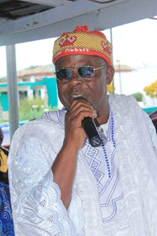Veteran Liberian politician Chief Cyril Allen has expressed his discontent with the current state of the House of Representatives, criticizing its members for publicly ridiculing the institution. In an interview conducted in Monrovia on October 20, 2024, Allen, the National Patriotic Party (NPP) Chairman Emeritus, cited a growing concern over the alleged lack of education among the lawmakers, claiming that many are unqualified to serve in such a crucial capacity. He articulates that the House is compromised by representatives who, instead of prioritizing the interests of the Liberian people, focus on superficial appearances—like wearing sharp-nosed shoes and mixed-colored outfits—with the intent to impress their constituents. For Allen, this is more than a fashion issue; he suggests it mirrors a broader problem of inadequate representation rooted in tribal politics and dishonesty during elections.
According to Allen, many of the representatives are merely high school dropouts or possess fraudulent degrees from untrustworthy institutions. He claims this educational deficiency is detrimental to Liberia’s governance and image, creating a situation where even the well-educated lawmakers among them are at a disadvantage. He highlights that these competent officials face significant obstacles, as they must navigate legislative processes alongside those who lack a fundamental understanding of their responsibilities. Allen calls out the hypocrisy of these lawmakers, who, despite their inadequacies, wield power and influence while effectively sidelining more qualified Liberians who aspire to contribute positively to the nation’s development.
The political climate has recently become more tumultuous, particularly following a dramatic scene in the Capitol on October 17, 2024. A faction within the House of Representatives attempted to initiate a resolution to remove Speaker Fonati Koffa from office, alleging that he breached the Constitution by acting as legal counsel for major concessionaires in Liberia. This move, signifying bipartisan dissent, implicated lawmakers from various political affiliations, including the ruling Unity Party and the opposition Coalition for Democratic Change. Tensions escalated when a dissenting lawmaker, Rep. Luther Collins of Gbarpolu County, disclosed that he and others were bribed to support the petition.
In a revealing twist, Rep. Collins showcased a substantial amount of cash in a video, claiming that he joined the attempt to expose the corrupt nature of the legislators behind the resolution. He stated that he had received an upfront payment of US$15,000 as part of the US$25,000 promised to endorse the motion against Koffa. His revelations not only undermined the credibility of the resolution but also painted a grim picture of ethics within the legislative body, further echoing Allen’s concerns regarding the character and qualifications of many lawmakers. This incident illustrates a serious flaw in the political processes wherein monetary inducements undermine integrity and governance.
Amid these unfolding events, Chief Allen warns that the ongoing political drama and disarray represent a regression for Liberia. He draws a stark contrast between Liberia and its neighboring countries, which, according to him, continue to advance in terms of development while Liberia remains stagnant and troubled by its internal conflicts. He emphasizes the urgent need for real change in leadership and governance to rekindle hope for the Liberian people who are eager for responsible and competent representation. By characterizing the actions of lawmakers as insensitive to the pressing issues faced by citizens, he calls attention to their apparent disconnect from the realities that their constituents endure daily.
The growing discontent with the performance of the House of Representatives suggests a broader crisis of legitimacy and trust in the political system in Liberia. Observers note that a significant number of lawmakers, many of whom supported the controversial resolution against Koffa, have failed to prioritize the needs and aspirations of their constituents. Political analysts have criticized this move as emblematic of a political class that has lost touch with the public, opting instead for power struggles and internal feuds. Many Liberians are left disillusioned as they witness their representatives engaging in behaviors that foster corruption instead of promoting robust governance and accountability.
In conclusion, Chief Cyril Allen’s criticisms reflect a critical assessment of the current political landscape in Liberia, spotlighting the shortcomings of lawmakers who lack the necessary qualifications and integrity. His perspective echoes a sentiment shared by many citizens who yearn for effective leadership that prioritizes the welfare of the nation over self-serving agendas. As political controversies continue to unfold, the call for a reevaluation of the qualifications and ethical standards of public representatives becomes increasingly urgent, aiming to reclaim the principles of democracy and governance that serve the interests of the Liberian people.


